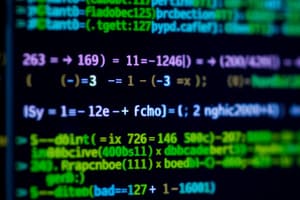Podcast
Questions and Answers
What is the basic set of operations for the relational model?
What is the basic set of operations for the relational model?
- Domain theory
- Relational algebra (correct)
- Set theory
- Procedural language
Define relational algebra.
Define relational algebra.
The basic set of operations for the relational model that allows the specification of basic retrievals.
What is algebra based on?
What is algebra based on?
Operators and a domain of values.
What does the term 'domain' refer to in relational algebra?
What does the term 'domain' refer to in relational algebra?
Which of the following are considered basic operators in relational algebra? (Select all that apply)
Which of the following are considered basic operators in relational algebra? (Select all that apply)
What operation is used to select a subset of tuples from a relation?
What operation is used to select a subset of tuples from a relation?
List the properties of the select operation.
List the properties of the select operation.
What does the project operation do?
What does the project operation do?
What is the general form of the project operation?
What is the general form of the project operation?
What is the result of the set difference operation R-S?
What is the result of the set difference operation R-S?
What does Cartesian product do?
What does Cartesian product do?
What is the 'join operation' used for?
What is the 'join operation' used for?
What is an equijoin?
What is an equijoin?
What is a natural join?
What is a natural join?
Name an additional relational operation.
Name an additional relational operation.
Flashcards are hidden until you start studying
Study Notes
Relational Algebra
- Fundamental operations of the relational model designed for basic data retrieval.
- Produces new relations from one or more existing relations that can be manipulated further.
- A sequence of operations results in a relation, representing the outcome of a database query.
Algebra Defined
- A system comprising operators and a value domain.
- Operators transform values from one domain into another.
- When the domain consists of relations, the resulting system is relational algebra.
Domain
- Refers to a set of relations.
Basic Operators
- Include Select, Project, Union, Set Difference, and Cartesian (Cross) Product.
Derived Operators
- Comprise Set Intersection, Division, and Join.
Procedural Nature
- Relational expressions detail queries through an algorithmic approach, specifying the order of operations to derive results.
Select Operation
- Filters tuples from a relation based on a specified condition, retaining only matching tuples.
- Represented as ø(R), where ø (sigma) indicates the selection operator and the condition is a Boolean expression.
Select Operation Properties
- The output relation S maintains the same schema as the source relation R.
- SELECT operation is commutative and can be cascaded in any order.
- Cascaded SELECT operations can be simplified into a single selection by combining conditions.
Project Operation
- Extracts specified columns from a relation while discarding the rest.
- Automatically eliminates duplicate tuples, yielding a valid relation.
General Form of Project Operation
- Denoted as TT(R); TT symbolizes the project operation, followed by desired attributes.
Project Operation Properties
- The number of resulting tuples is less than or equal to that of R.
- If the attribute list includes a key, the tuple count will equal that of R.
Relational Algebra Operations from Set Theory
- Include Union, Intersection, Minus, and Cartesian Product (Cross Product).
Set Operators
- Treat relations as sets of tuples allowing set operations.
- Results from combining two relations using set operators produce a new relation with the same structure.
Union Operation
- Denoted by R U S, combining all unique tuples from R, S, or both.
- Eliminates duplicate tuples and requires type compatibility between operands.
Type (Union) Compatibility
- Operand relations must possess the same number and compatible types of attributes.
Set Difference Operation
- Represented as R - S, results in tuples present in R but absent in S, requiring type compatibility.
Cartesian (Cross) Product
- The result of R x S is all possible concatenated tuples formed by combining tuples from relations R and S.
Binary Relational Operations
- Comprise Join Operation, Equijoin, Natural Join, and Division Operation.
Join Operation
- Combines Cartesian product with selection to identify related tuples from multiple relations.
- Essential for managing relationships in relational databases.
General Form of a Join Operation
- Denoted as RS.
Equijoin
- The most prevalent type of join, relying on equality comparisons.
- Requires at least one pair of attributes to match identically across tuples.
Natural Join
- Streamlines the join process by eliminating redundant attributes that bear identical values.
- Requires matched attribute names across both relations during the join.
Additional Relational Operations
- Include Aggregate Functions, Grouping, Recursive Closure Operations, and Outer Join Operations.
Outer Joins
- Retain all tuples from R, S, or both, making them useful for comprehensive data retrieval scenarios.
Studying That Suits You
Use AI to generate personalized quizzes and flashcards to suit your learning preferences.




